In a world brimming with uncertainty and challenges, understanding the dynamics of courage and fear becomes essential. This collection of Courage and Fear quotes from eminent figures like Nelson Mandela, Winston Churchill, and Maya Angelou offers profound insights into the human spirit’s capacity to confront and transcend fear.

Table of Contents
Each quote is a testament to the power of courage as a transformative force and serves as a beacon of inspiration for anyone looking to navigate life’s tumultuous seas with bravery and resilience. Dive into the depths of these powerful words and discover the courage within.
Does Courage Come From Fear?
Courage and fear are deeply connected, even though they seem like opposites. Many believe that courage is the absence of fear, but the truth is quite different. Courage often emerges because of fear, not in its absence. In this article, we’ll explore the relationship between courage and fear, how fear can inspire bravery, and why embracing fear can lead to personal growth.
What Is Courage?
Courage is the ability to face challenges, dangers, or fears despite feeling afraid. It’s not about being fearless; instead, it’s about taking action even when fear is present.
Types of Courage
- Physical Courage: Facing physical dangers or risks.
- Example: Firefighters running into burning buildings to save lives.
- Emotional Courage: Facing vulnerability or emotional pain.
- Example: Expressing your true feelings or standing up for what you believe in.
- Moral Courage: Standing up for what is right, even when it’s unpopular.
- Example: Advocating for justice despite opposition.
What Is Fear?
Fear is a natural response to danger or perceived threats. It triggers the fight-or-flight response, preparing your body to react. While fear is often seen as negative, it serves a valuable purpose:
- Protecting Us: Fear warns us of potential harm.
- Motivating Action: Fear can push us to confront challenges.
How Does Courage Come From Fear?
1. Fear Sparks Action
When faced with fear, some people choose to confront it rather than run from it. This choice to act despite fear is the essence of courage.
- Example: A parent rushing into danger to save their child. Their fear for their child’s safety drives their brave actions.
2. Fear Builds Resilience
Overcoming fear strengthens your ability to face future challenges. Each time you confront fear, you build confidence and develop courage.
- Example: Public speaking becomes less terrifying after facing the fear multiple times.
3. Fear Highlights What Matters
Fear often arises when something important is at stake. Courage grows when you prioritize those values over the fear itself.
- Example: Standing up for a friend despite fear of backlash shows the importance of friendship.
4. Courage Redefines Fear
Fear can transform from a barrier to an opportunity. People who embrace fear as part of growth often find it easier to act courageously.
Why Courage Requires Fear
Courage wouldn’t exist without fear. If there’s no fear, there’s no challenge to overcome. Fear is what makes acts of courage meaningful and inspiring.
Famous Quote on Fear and Courage
- Nelson Mandela once said, “I learned that courage was not the absence of fear, but the triumph over it. The brave man is not he who does not feel afraid, but he who conquers that fear.”
This quote highlights that courage doesn’t eliminate fear but rises above it.
How to Cultivate Courage from Fear
- Acknowledge Your Fear
Recognize and accept your fear. Denying it won’t help you grow. - Break It Down
Understand what you’re afraid of and why. This makes the fear more manageable. - Take Small Steps
Facing fear doesn’t mean leaping into danger. Start with small actions to build your courage gradually. - Focus on Your Values
Let your principles and goals guide you, not your fear. - Learn from Others
Look to role models who have faced fear with courage for inspiration. - Practice Resilience
Each small victory over fear builds your courage for bigger challenges.
Examples of Courage Born from Fear
1. Historical Example: Rosa Parks
Rosa Parks felt fear when she refused to give up her seat on the bus, but her courage to stand up for civil rights inspired a movement.
2. Everyday Example: Overcoming Anxiety
Someone facing a fear of heights might climb a small hill, then gradually tackle bigger challenges, building courage along the way.
Does Courage Come From Fear?
Courage and fear are deeply connected, even though they seem like opposites. Many believe that courage is the absence of fear, but the truth is quite different. Courage often emerges because of fear, not in its absence. In this article, we’ll explore the relationship between courage and fear, how fear can inspire bravery, and why embracing fear can lead to personal growth.
What Is Courage?
Courage is the ability to face challenges, dangers, or fears despite feeling afraid. It’s not about being fearless; instead, it’s about taking action even when fear is present.
Types of Courage
- Physical Courage: Facing physical dangers or risks.
- Example: Firefighters running into burning buildings to save lives.
- Emotional Courage: Facing vulnerability or emotional pain.
- Example: Expressing your true feelings or standing up for what you believe in.
- Moral Courage: Standing up for what is right, even when it’s unpopular.
- Example: Advocating for justice despite opposition.
What Is Fear?
Fear is a natural response to danger or perceived threats. It triggers the fight-or-flight response, preparing your body to react. While fear is often seen as negative, it serves a valuable purpose:
- Protecting Us: Fear warns us of potential harm.
- Motivating Action: Fear can push us to confront challenges.
How Does Courage Come From Fear?
1. Fear Sparks Action
When faced with fear, some people choose to confront it rather than run from it. This choice to act despite fear is the essence of courage.
- Example: A parent rushing into danger to save their child. Their fear for their child’s safety drives their brave actions.
2. Fear Builds Resilience
Overcoming fear strengthens your ability to face future challenges. Each time you confront fear, you build confidence and develop courage.
- Example: Public speaking becomes less terrifying after facing the fear multiple times.
3. Fear Highlights What Matters
Fear often arises when something important is at stake. Courage grows when you prioritize those values over the fear itself.
- Example: Standing up for a friend despite fear of backlash shows the importance of friendship.
4. Courage Redefines Fear
Fear can transform from a barrier to an opportunity. People who embrace fear as part of growth often find it easier to act courageously.
Why Courage Requires Fear
Courage wouldn’t exist without fear. If there’s no fear, there’s no challenge to overcome. Fear is what makes acts of courage meaningful and inspiring.
Famous Quote on Fear and Courage
- Nelson Mandela once said, “I learned that courage was not the absence of fear, but the triumph over it. The brave man is not he who does not feel afraid, but he who conquers that fear.”
This quote highlights that courage doesn’t eliminate fear but rises above it.
How to Cultivate Courage from Fear
- Acknowledge Your Fear
Recognize and accept your fear. Denying it won’t help you grow. - Break It Down
Understand what you’re afraid of and why. This makes the fear more manageable. - Take Small Steps
Facing fear doesn’t mean leaping into danger. Start with small actions to build your courage gradually. - Focus on Your Values
Let your principles and goals guide you, not your fear. - Learn from Others
Look to role models who have faced fear with courage for inspiration. - Practice Resilience
Each small victory over fear builds your courage for bigger challenges.
Examples of Courage Born from Fear
1. Historical Example: Rosa Parks
Rosa Parks felt fear when she refused to give up her seat on the bus, but her courage to stand up for civil rights inspired a movement.
2. Everyday Example: Overcoming Anxiety
Someone facing a fear of heights might climb a small hill, then gradually tackle bigger challenges, building courage along the way.
15 Timeless Courage and Fear Quotes
1. “Courage is not the absence of fear, but rather the judgment that something else is more important than fear.” – Ambrose Redmoon

This quote implies that courage involves making a conscious choice to prioritize something greater than one’s fear, highlighting the deliberative nature of bravery.
2. “Fear is a reaction. Courage is a decision.” – Winston S. Churchill

Churchill suggests that while fear is instinctual, courage is a deliberate choice, emphasizing the power of human will over instinctual reactions.
3. “The brave man is not he who does not feel afraid, but he who conquers that fear.” – Nelson Mandela
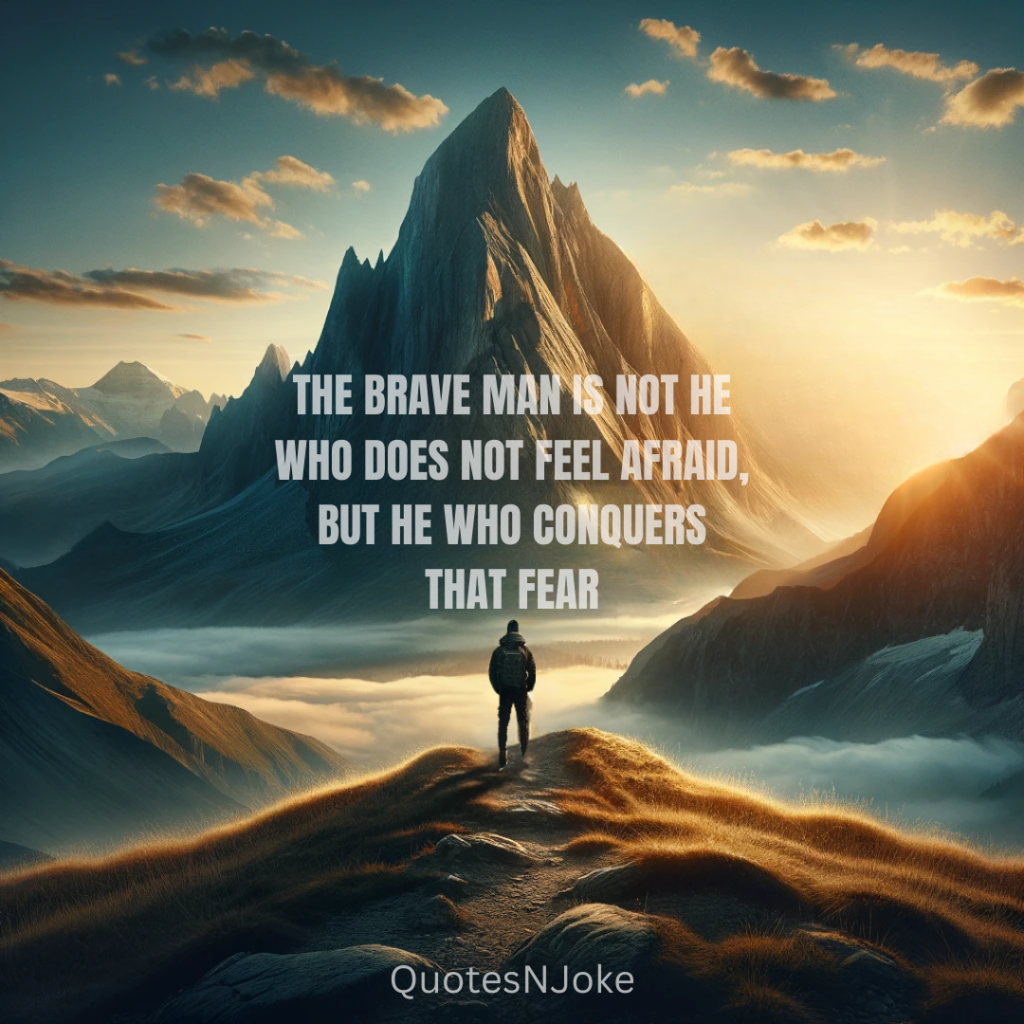
Mandela shares his personal insight, revealing that bravery is about managing fear, not eliminating it, and that facing fear is a triumph in itself.
4. “I learned that courage was not the absence of fear, but the triumph over it.” – Nelson Mandela
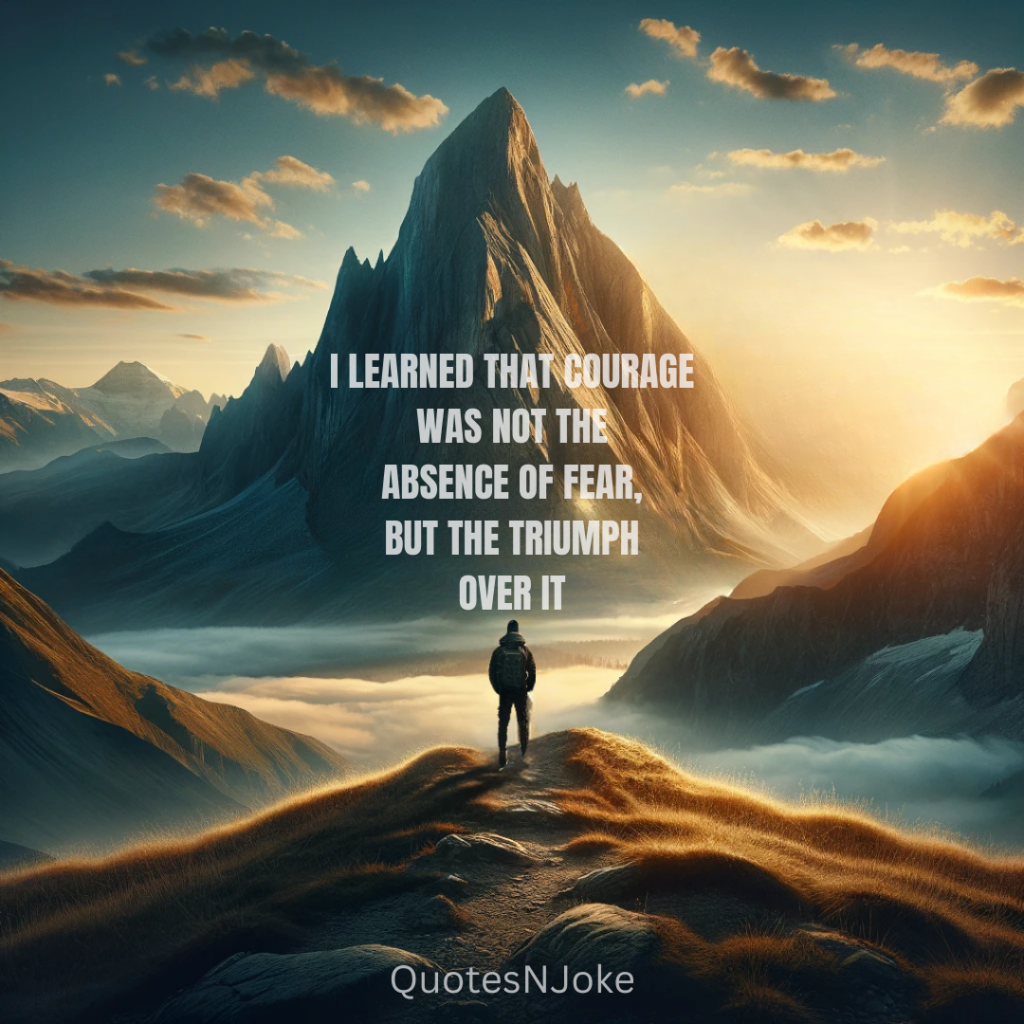
This quote reflects on Mandela’s own journey, suggesting that understanding and overcoming fear is a continual process that leads to true courage.
5. “He who is not everyday conquering some fear has not learned the secret of life.” – Ralph Waldo Emerson
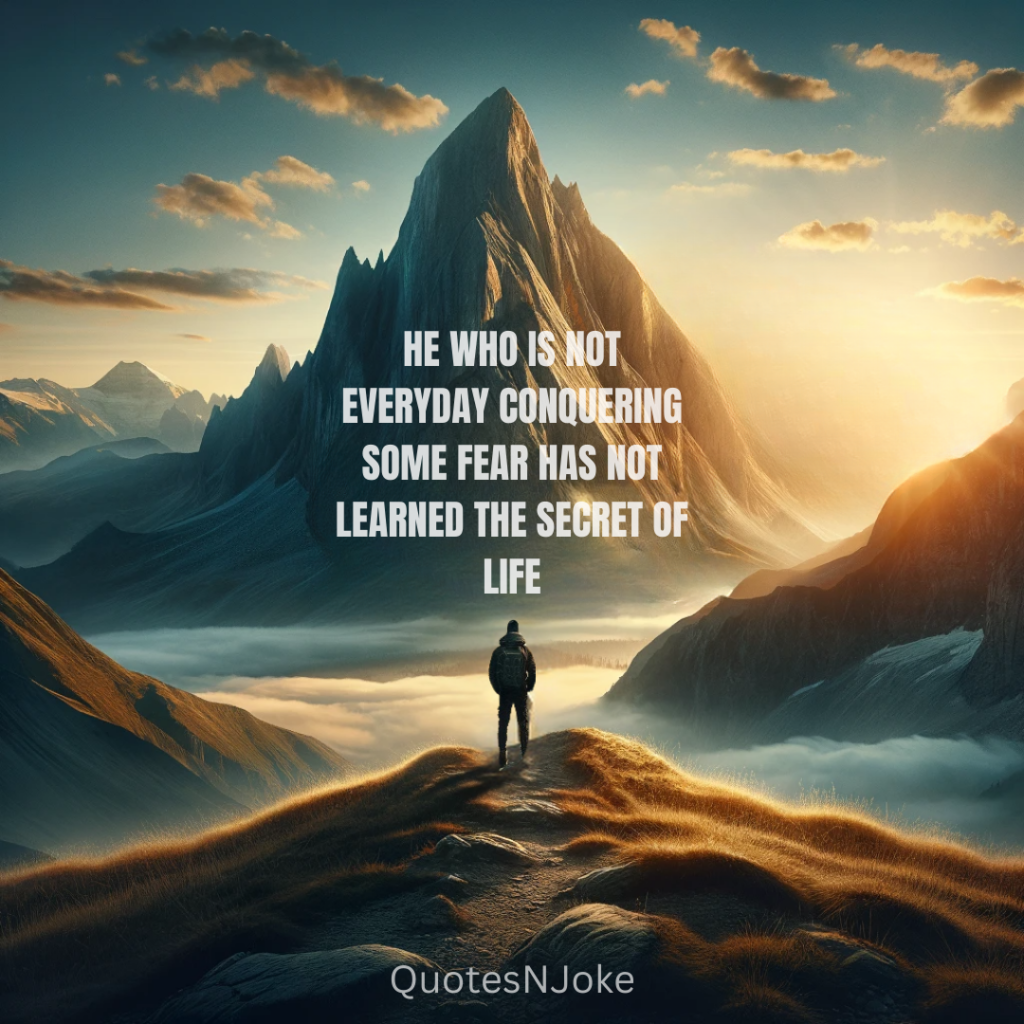
Emerson encourages daily confrontations with fear as a necessary step for personal growth and discovery.
6. “Courage is the most important of all the virtues because without courage, you can’t practice any other virtue consistently.” – Maya Angelou
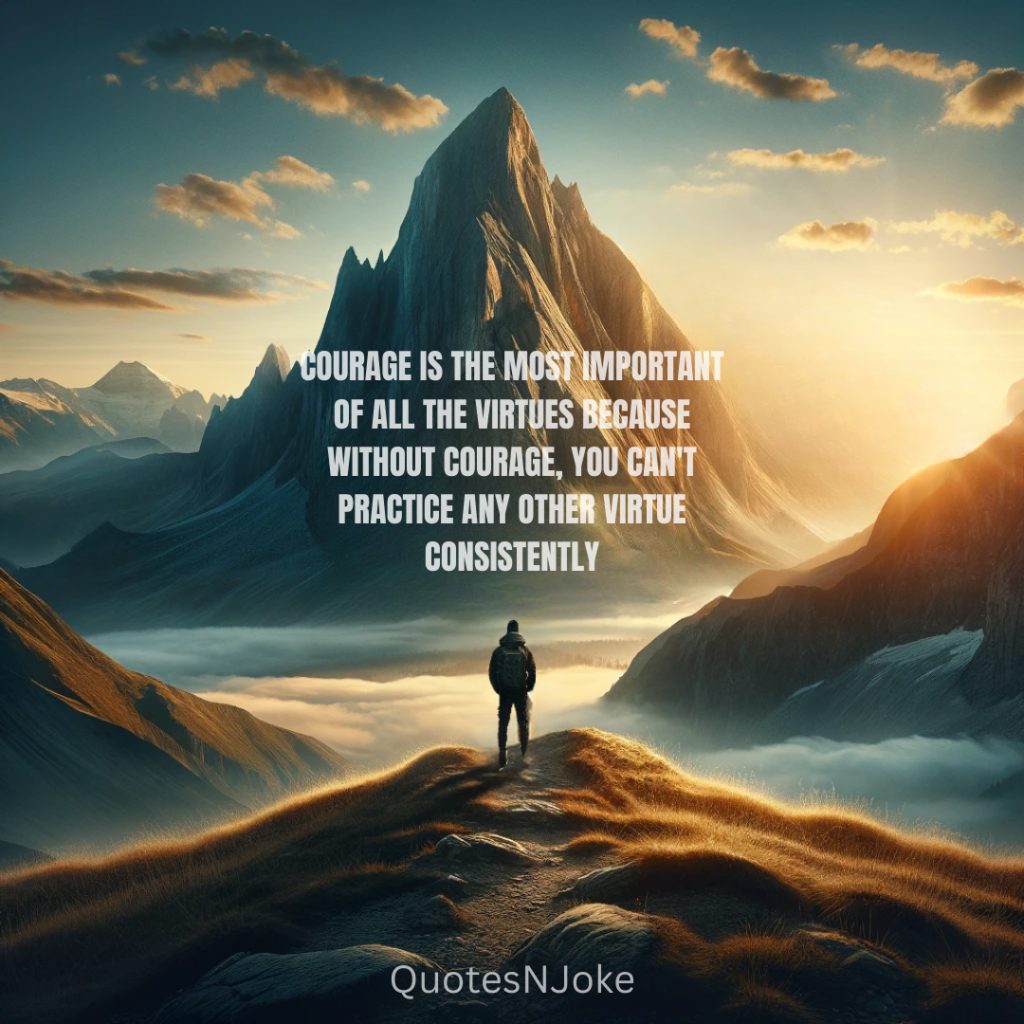
Angelou places courage as the foundational virtue, suggesting that it is essential for the practice and maintenance of all other virtues.
7. “Fear defeats more people than any other one thing in the world.” – Ralph Waldo Emerson
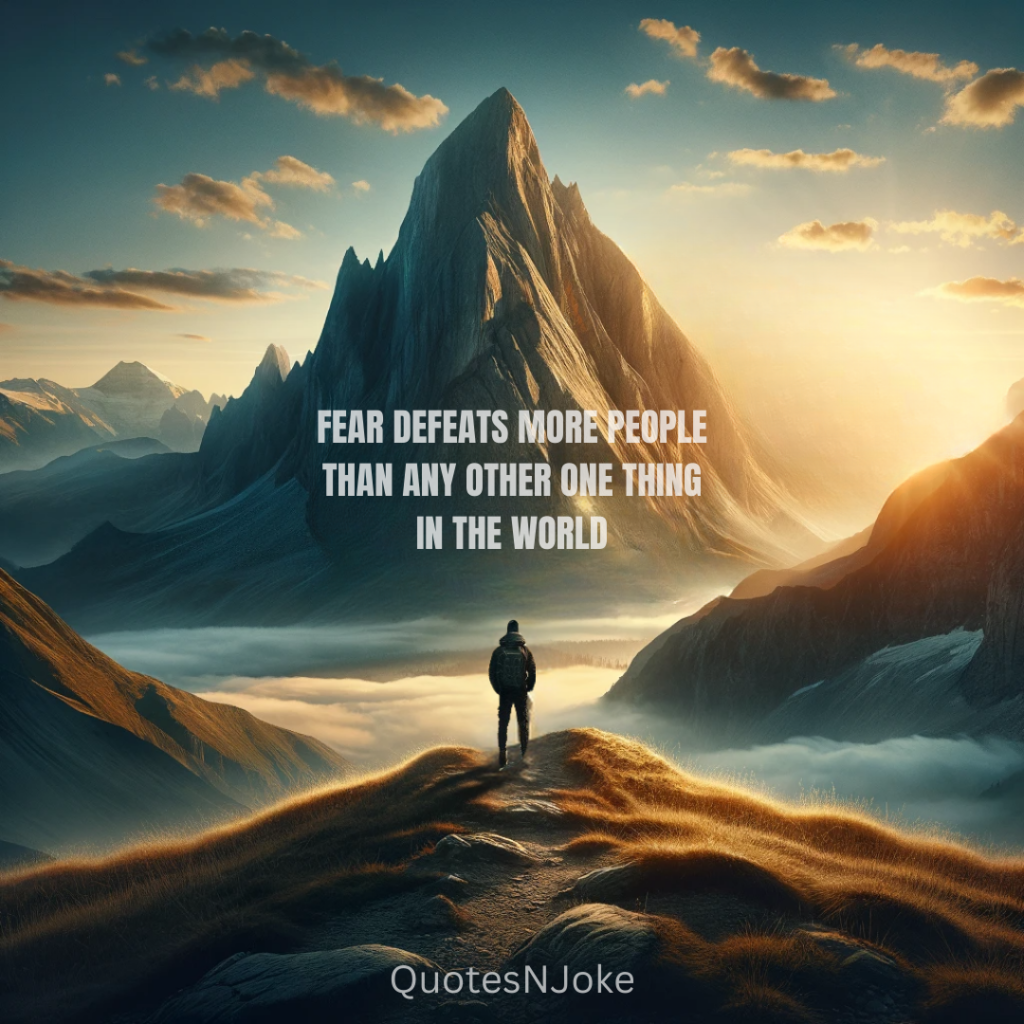
This quote emphasizes the debilitating effect of fear, suggesting that it’s a significant barrier to human potential.
8. “Courage is resistance to fear, mastery of fear – not absence of fear.” – Mark Twain

Twain differentiates between the absence of fear and the control over it, implying that true courage comes from confronting and mastering fear.
9. “Do the thing you fear most and the death of fear is certain.” – Mark Twain

Twain advocates for facing one’s fears directly, implying that such actions lead to the eradication of fear.
10. “It is not death that a man should fear, but he should fear never beginning to live.” – Marcus Aurelius

The Roman emperor philosophizes on life’s true fear, suggesting that a life unexamined and unattempted is more frightening than death.
11. “You gain strength, courage, and confidence by every experience in which you really stop to look fear in the face.” – Eleanor Roosevelt

Roosevelt speaks to the empowering effect of confronting fears, suggesting that facing fears is a source of personal strength and confidence.
12. “Only when we are brave enough to explore the darkness will we discover the infinite power of our light.” – Brené Brown

Brown encourages an exploration of one’s inner fears and darkness to uncover and unleash one’s true potential and power.
13. “Being deeply loved by someone gives you strength, while loving someone deeply gives you courage.” – Lao Tzu

This quote suggests that love imparts different forms of courage, with the act of loving giving as much strength as being loved.
14. “Courage starts with showing up and letting ourselves be seen.” – Brené Brown

Brown highlights the courage it takes to be vulnerable and present, suggesting that true bravery is about openness and visibility.
15. “To escape fear, you have to go through it, not around.” – Richie Norton

Norton’s quote suggests that the only way to truly overcome fear is to move through it, emphasizing action as the pathway to freedom from fear.
Conclusion
Courage doesn’t mean being fearless—it means acting in spite of fear. Fear is the foundation of courage, motivating us to confront challenges and grow as individuals. By acknowledging fear, understanding its role, and taking deliberate steps to face it, anyone can cultivate courage and transform fear into strength.
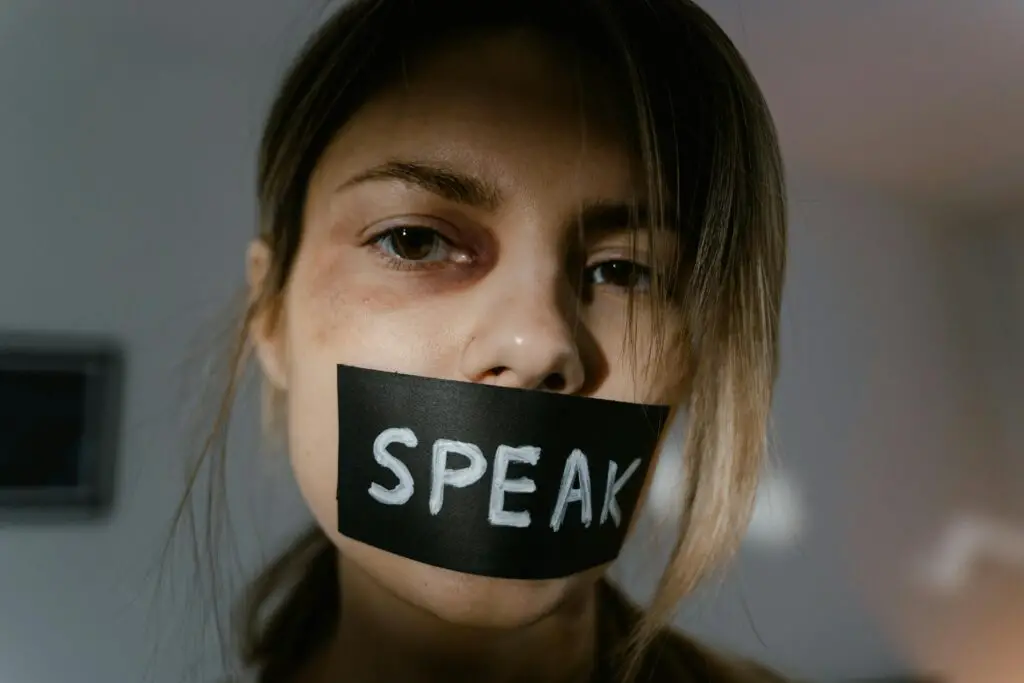
As we’ve journeyed through these thought-provoking quotes, it’s clear that courage isn’t a mere absence of fear but a triumphant conquest over it. The wisdom shared by luminaries like Mandela, Twain, and Brown sheds light on the strength and resolve inherent in every individual.
These 15 Courage and Fear quotes don’t just echo through the annals of history; they resonate within the chambers of our own lives, urging us to face our fears and embrace the courage that shapes destinies. As we reflect on these profound insights, let’s carry forward the understanding that our fears don’t define us, but overcoming them does, propelling us toward a life of purpose and bravery.
